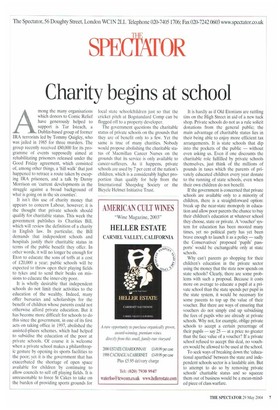Charity begins at school
Among the many organisations which donors to Comic Relief have generously helped to support is Tar Isteach, a Dublin-based group of former IRA terrorists led by Tommy Quigley, who was jailed in 1985 for three murders. The group recently received £80,000 for its programme of events supposedly aimed at rehabilitating prisoners released under the Good Friday agreement, which consisted of, among other things, a 'hill walk' that just happened to retrace a route taken by escaping IRA prisoners, and a talk by Danny Morrison on 'current developments in the struggle against a broad background of what is going on in the six counties'.
It isn't this use of charity money that appears to concern Labour, however; it is the thought that private schools should qualify for charitable status. This week the government publishes its Charities Bill, which will review the definition of a charity in English law. In particular. the Bill demands that independent schools and hospitals justify their charitable status in terms of the public benefit they offer. In other words, it will no longer be enough for Eton to educate the sons of toffs at a cost of £20,000 a year; public schools will be expected to throw open their playing fields , to tykes and to send their beaks on missions to educate the inner-city poor.
It is wholly desirable that independent schools do not limit their activities to the education of the wealthy. Indeed, many offer bursaries and scholarships for the benefit of children whose parents could not otherwise afford private education. But it has become more difficult for schools to do this since the government, in one of its first acts on taking office in 1997, abolished the assisted-places schemes, which had helped to subsidise the education of the poor at private schools. Of course it is welcome when a private school makes a philanthropic gesture by opening its sports facilities to the poor; yet it is the government that has exacerbated the shortage of open space available for children by continuing to allow councils to sell off playing fields. It is unreasonable to force St Cakes to take on the burden of providing sports grounds for local state schoolchildren just so that the cricket pitch at Bogstandard Comp can be flogged off to a property developer.
The government questions the charitable status of private schools on the grounds that they are of benefit only to a few. Yet the same is true of many charities. Nobody would propose abolishing the charitable status of Macmillan Cancer Nurses on the grounds that its service is only available to cancer-sufferers. As it happens, private schools are used by 7 per cent of the nation's children, which is a considerably higher proportion than qualify for help from the International Sheepdog Society or the Bicycle Helmet Initiative Trust. It is hardly as if Old Etonians are rattling tins on the High Street in aid of a new tuck shop. Private schools do not as a rule solicit donations from the general public; the main advantage of charitable status lies in their being able to enjoy more efficient tax arrangements. It is state schools that dip into the pockets of the public — without even asking us. Even if one discounts the charitable role fulfilled by private schools themselves, just think of the millions of pounds in taxes which the parents of privately educated children every year donate to the running of state schools, even when their own children do not benefit.
If the government is concerned that private schools are available only to a minority of children, there is a straightforward option: break up the near-state monopoly in education and allow poor parents the chance to buy their children's education at whatever school they choose, state or private. A 'voucher' system for education has been mooted many times, yet no political party has yet been brave enough to launch it as a policy — sadly the Conservatives' proposed 'pupils' passports' would be exchangeable only at state schools.
Why can't parents go shopping for their children's education in the private sector using the money that the state now spends on state schools? Clearly, there are some problems with such a proposal. Because it costs more on average to educate a pupil at a private school than the state spends per pupil in the state system, it would be necessary for some parents to top up the value of their voucher. But there are ways of ensuring that vouchers do not simply end up subsidising the fees of pupils who are already at private schools. Why not, for example, oblige private schools to accept a certain percentage of their pupils — say 25 — at a price no greater than the face value of a voucher? If a private school refused to accept this deal, no vouchers would be allowed to be used at the school.
To seek ways of breaking down the 'educational apartheid' between the state and independent schools sector is a laudable aim. But to attempt to do so by removing private schools' charitable status and so squeeze them out of business would be a mean-minded piece of class warfare.


































































 Previous page
Previous page